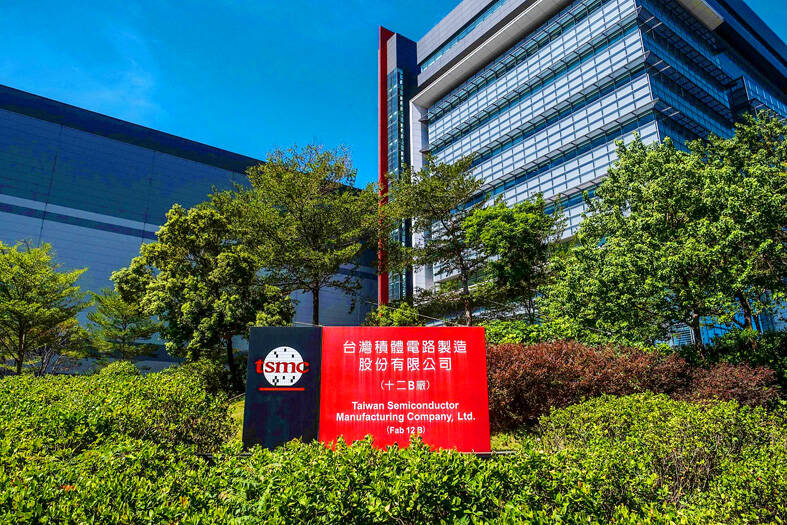Taiwan Semiconductor Manufacturing Co (TSMC, 台積電) aims to build a second chipmaking plant in Arizona, after it committed to building a US$12 billion complex in the state, the Wall Street Journal reported, citing people familiar with the plans.
The world’s largest contract chipmaker would announce its intention to establish another facility north of Phoenix, adjacent to the factory under construction, the newspaper reported.
The new investment should be similar to the first project’s, it added.

Photo: Lam Yik Fei, Bloomberg
Representatives for the company did not respond to requests for comment.
The administration of US President Joe Biden is trying to attract investments in US chipmaking, part of efforts to counter China’s ambitions and secure components vital to US national security. That effort accelerated after widespread shortages that began in late 2020 and last year drove home how chips were central to the production of everything from vehicles to smartphones.
Washington, which is dangling incentives of about US$50 billion for local projects, has hailed TSMC’s Arizona expansion as a triumph in endeavors to bring advanced chipmaking to the US.
The Taiwanese company has said that it costs much more to produce semiconductors in the US, although higher expenses are manageable with state support.
TSMC, whose production sites are mostly in Taiwan, has started to diversify over the past few years to help meet demand in major countries seeking to bolster domestic semiconductor production. It joins rivals, including Samsung Electronics Co, which is establishing a US$17 billion fab in Texas.
TSMC is building a US$7 billion facility in Japan and is also in early talks with the German government about potentially establishing a plant in the country.
On Tuesday, TSMC’s board of directors approved a budget of US$5.71 billion, with the vast majority to be spent on production involving specialty and advanced manufacturing processes.
TSMC said advanced manufacturing processes would receive about 70 to 80 percent of the funding, while 10 to 20 percent would be spent on specialty processes, with the remaining about 10 percent earmarked for advanced packaging and testing, as well as photomasking development.
TSMC last month said it would cut its capital expenditure for this year to about US$36 billion from the lower end of a range from US$40 billion to US$44 billion in the previous capital spending plan, citing short-term market uncertainty.
The global semiconductor industry is undergoing inventory adjustments at a time when major central banks have raised key interest rates to fight fast-growing inflation, which has hurt demand.
Additional reporting by CNA

South Korea’s equity benchmark yesterday crossed a new milestone just a month after surpassing the once-unthinkable 5,000 mark as surging global memory demand powers the country’s biggest chipmakers. The KOSPI advanced as much as 2.6 percent to a record 6,123, with Samsung Electronics Co and SK Hynix Inc each gaining more than 2 percent. With the benchmark now up 45 percent this year, South Korea’s stock market capitalization has also moved past France’s, following last month’s overtaking of Germany’s. Long overlooked by foreign funds, despite being undervalued, South Korean stocks have now emerged as clear winners in the global market. The so-called “artificial intelligence

NEW IDENTITY: Known for its software, India has expanded into hardware, with its semiconductor industry growing from US$38bn in 2023 to US$45bn to US$50bn India on Saturday inaugurated its first semiconductor assembly and test facility, a milestone in the government’s push to reduce dependence on foreign chipmakers and stake a claim in a sector dominated by China. Indian Prime Minister Narendra Modi opened US firm Micron Technology Inc’s semiconductor assembly, test and packaging unit in his home state of Gujarat, hailing the “dawn of a new era” for India’s technology ambitions. “When young Indians look back in the future, they will see this decade as the turning point in our tech future,” Modi told the event, which was broadcast on his YouTube channel. The plant would convert

‘SEISMIC SHIFT’: The researcher forecast there would be about 1.1 billion mobile shipments this year, down from 1.26 billion the prior year and erasing years of gains The global smartphone market is expected to contract 12.9 percent this year due to the unprecedented memorychip shortage, marking “a crisis like no other,” researcher International Data Corp (IDC) said. The new forecast, a dramatic revision down from earlier estimates, gives the latest accounting of the ongoing memory crunch that is affecting every corner of the electronics industry. The demand for advanced memory to power artificial intelligence (AI) tasks has drained global supply until well into next year and jeopardizes the business model of many smartphone makers. IDC forecast about 1.1 billion mobile shipments this year, down from 1.26 billion the prior

People stand in a Pokemon store in Tokyo on Thursday. One of the world highest-grossing franchises is celebrated its 30th anniversary yesterday.